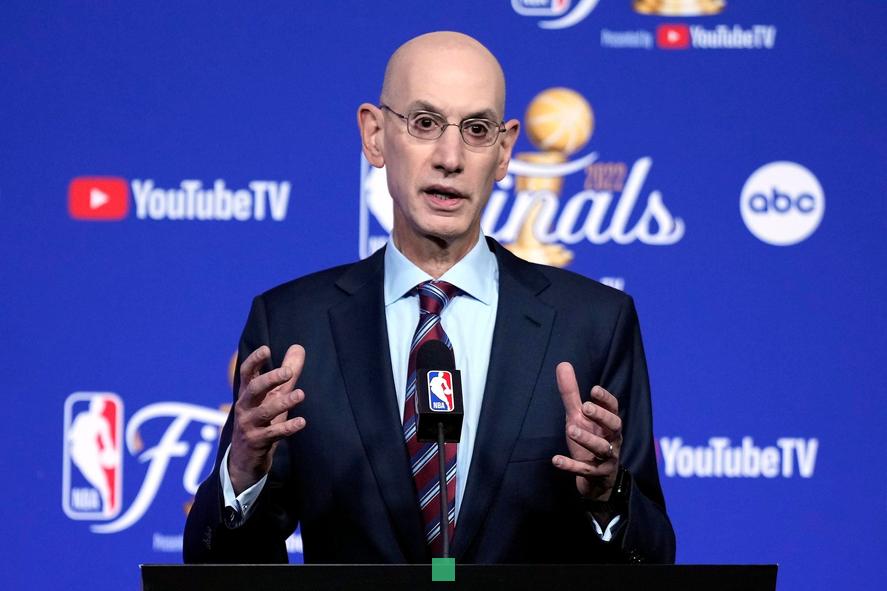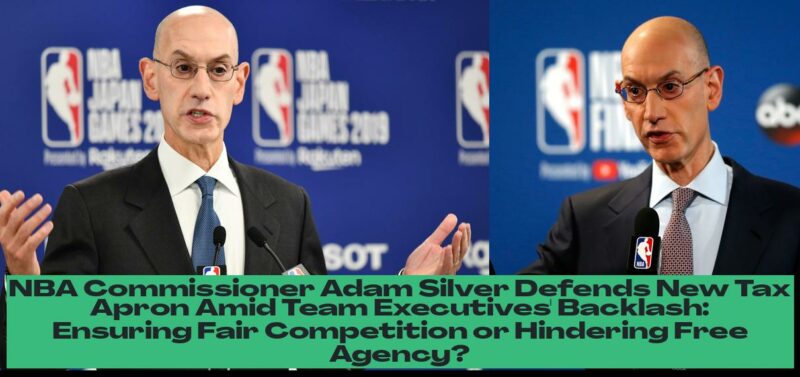NBA commissioner Adam Silver defends new tax apron following team executives’ criticism

The NBA landscape has undergone a significant transformation since the approval of the latest collective bargaining agreement. Teams are now navigating a new reality, one defined by stricter financial constraints and a renewed focus on competitive balance. This shift has sparked debates and disagreements, particularly regarding the newly implemented tax apron, which has become a point of contention between the league and team executives.
The tax apron, essentially a second luxury tax threshold, was introduced to discourage teams from exceeding a certain spending limit. While the league argues that this measure promotes parity and ensures greater competition across all 30 franchises, some team executives have expressed frustration and concerns about its impact on roster building and team performance.
The Clippers’ loss of All-Star Paul George to the 76ers in free agency is a prime example of the challenges teams are facing in the new CBA era. The Clippers cited the limitations imposed by the tax apron as a key factor in their inability to retain George. Similar situations have played out with other teams, like the Nuggets losing Kentavious Caldwell-Pope, and the Lakers bracing for potential difficulties.
The new tax apron has become a hot topic of discussion, with team executives voicing their concerns about its potential to stifle their ability to build championship-caliber rosters. However, NBA commissioner Adam Silver has defended the tax apron, arguing that it is essential for creating a more level playing field and ensuring a competitive environment for all teams.
During a press conference following the NBA’s board of governors meetings, Silver addressed the criticism surrounding the tax apron, emphasizing its role in promoting parity and fostering a more balanced league. He acknowledged that the new system might lead to some initial adjustments and potentially a quieter offseason in terms of big-name player movement, but he maintained that the long-term benefits outweigh the short-term challenges.
Silver emphasizes the importance of competition and a level playing field
Silver’s stance on the tax apron is rooted in his belief that it is crucial for creating a more competitive league. He argues that by discouraging teams from spending excessively and creating a gap between the top spenders and the rest of the league, the tax apron creates a more equitable environment where all teams have a realistic chance of competing for a championship.
He points to the fact that the NBA has seen six different champions in the past six years as evidence that the league is moving in the right direction in terms of competitive balance. While acknowledging that the tax apron may initially impact the free agency period, Silver believes it will ultimately lead to a more robust and exciting league where more teams have a legitimate chance of making a deep playoff run.
The NBA commissioner’s argument is not without merit. The tax apron, in theory, should prevent teams from accumulating a significant financial advantage by spending lavishly on players. This, in turn, creates a more balanced playing field where teams with less financial resources have a greater opportunity to compete. This could ultimately lead to a more unpredictable and exciting league, with more teams vying for the championship.
However, the implementation of the tax apron has also raised concerns about its potential impact on the league’s overall competitiveness. Some argue that the tax apron could lead to a situation where teams are forced to make difficult decisions, potentially sacrificing key players in order to stay under the threshold. This could result in a less competitive league, with fewer teams having the financial resources to build truly competitive rosters. The challenge for the NBA is to find a balance between promoting competitive balance and allowing teams the flexibility to build strong rosters.
Silver addresses concerns about the potential impact on free agency

Silver also addressed concerns about the potential impact of the tax apron on free agency, acknowledging that it might result in a less active period for player movement. While he acknowledged that the new system may lead to fewer high-profile free agent signings, he emphasized that the league still witnessed significant player movement during the recent offseason.
The commissioner’s focus on player movement highlights the delicate balance the NBA is trying to strike. While the league wants to promote competitive balance and prevent teams from spending their way to championships, it also recognizes the importance of free agency as a driving force in the league’s entertainment value. The goal is to create a system that allows for player movement without creating a significant imbalance in the league’s competitive landscape.
Silver’s defense of the tax apron, as well as his acknowledgement of the challenges it presents, underscores the ongoing conversation about the league’s future and the role of financial rules in shaping the competitive landscape. While the tax apron has sparked debate and controversy, it is a measure that the NBA believes is essential for maintaining a healthy and competitive league. The long-term impact of the tax apron remains to be seen, but the league’s commitment to promoting parity and ensuring a level playing field for all teams suggests that it is a measure that is here to stay.
Silver expresses “bittersweet” feelings about the Celtics’ sale
Beyond the tax apron, Silver also discussed other key topics during his press conference, including the Celtics’ recent announcement that they are up for sale. He expressed his disappointment and sadness about the news, acknowledging the Celtics’ recent success both on and off the court and highlighting the contributions of Celtics governor Wyc Grousbeck.
Silver praised Grousbeck for his leadership and commitment to the league, emphasizing his involvement in various aspects of the NBA’s operations. He acknowledged the personal circumstances that led to Grousbeck’s decision to sell the franchise, expressing empathy for the challenges faced by the Celtics’ ownership. While expressing his sadness at the news, Silver expressed confidence that the Celtics will continue to be a successful franchise under new ownership.
The Celtics’ sale is a reminder of the dynamic nature of NBA ownership, as franchises change hands and new ownership groups bring their own visions and perspectives to the league. While the Celtics’ sale is a significant event, it also reflects the league’s overall stability and continued growth. The NBA’s commitment to financial discipline and competitive balance is reflected in its approach to the tax apron, while the league’s overall health is evident in the continued interest in owning franchises.
Silver’s comments about the Celtics’ sale highlight the human element of the NBA, recognizing the personal and professional challenges faced by owners and executives. It also emphasizes the league’s commitment to fostering a culture of respect and collaboration, even as it navigates the complex financial realities of the modern NBA.
The NBA continues to evolve and adapt
The NBA is a constantly evolving league, and the implementation of the tax apron is just the latest example of its ongoing efforts to adapt to changing circumstances. The league is committed to ensuring a competitive balance and creating a sustainable environment for all franchises. The tax apron, while it has sparked debate and controversy, is a measure that the NBA believes is essential for achieving these goals.
The league’s willingness to make adjustments and implement new rules reflects its commitment to staying ahead of the curve and ensuring its continued success. As the NBA continues to evolve, the league’s focus on financial discipline and competitive balance will continue to be paramount, shaping the future of the league and the decisions made by team executives and the commissioner’s office.
The NBA is a complex and dynamic league, and the ongoing debate about the tax apron is just one example of the challenges and opportunities that it faces. The league’s commitment to financial discipline and competitive balance, coupled with its willingness to adapt to changing circumstances, suggests that the NBA is well-positioned for continued success in the years to come.
- NBA commissioner Adam Silver defends the new tax apron introduced in the latest collective bargaining agreement.
- The tax apron serves as a second luxury tax threshold to prevent teams from overspending, promoting parity and competitive balance.
- Some team executives have expressed concerns about the tax apron’s impact on roster building and team performance, citing examples like the Clippers losing Paul George.
- Silver maintains that while there may be initial challenges with the new system, it is crucial for creating a more level playing field and ensuring long-term competitiveness across all NBA teams.









